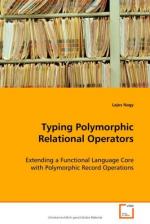|
This section contains 376 words (approx. 2 pages at 300 words per page) |

|
Relational operators, sometimes called comparison operators, are operators (symbols that represent a specific action) that allow computer programmers to compare two or more values. Typical relational operators are: greater than (>), equal to (=), less than (<), not equal to (<>, #, !, or ), greater than or equal to (), and less than or equal to ().
A relational expression is an expression that uses a relational operator such as "less than" to compare two or more values (called "operands"). Every expression consists of at least two operands and can have one or more relational operators. Operands are values (usually alphanumeric constants or variables), whereas operators represent particular pre-specified actions. The general form of a relational expression is a (rel-op) b where a and b are operands and rel-op (from relational-operator) generically refers to the various possible relational operators. With respect to the relational operators listed above: (1) a > b is true...
|
This section contains 376 words (approx. 2 pages at 300 words per page) |

|


